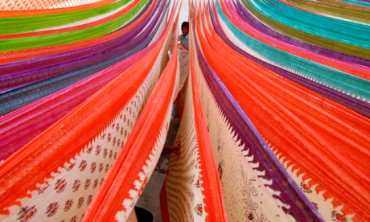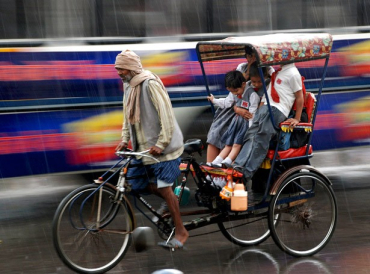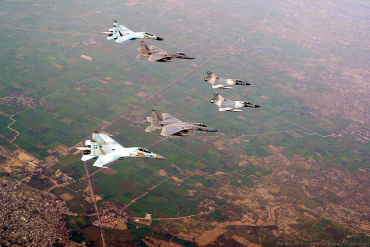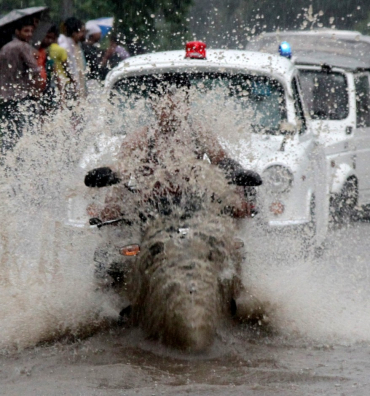Malini Bhupta in Mumbai
Global risk aversion and asset sell-offs have put emerging markets like India in a fix. Economies the world over are facing different sets of challenges.
Gerard Lyons, chief economist and global head of research, Standard Chartered, tells Malini Bhupta what's in store for markets and economies in the current climate of uncertainty.
Edited excerpts:
Global risk aversion has resulted in a sell-off in risk assets of emerging-market economies. How long do you see this continuing?
This will continue. It requires both an improvement in sentiment about the US outlook and signs that problems in the euro area are being addressed in order for market sentiment to return.
...
'India is cooling, not collapsing'
Image: In the West, the fundamentals are poor, he says.The outlook depends on the interaction between the fundamentals, policy and confidence.
In the West, the fundamentals are poor, the policy-cupboard is almost bare and confidence has been shot to pieces.
In contrast, across the emerging world, the fundamentals are better, there is plenty of room for policy manoeuvre and confidence may prove far more resilient.
...
'India is cooling, not collapsing'
Image: There is a strong case for Asian currencies to appreciate.Where do you expect emerging-market currencies will head over the next few months? Will the dollar continue to appreciate?
The dollar has benefited from a flight to quality and this could continue in the near term, as the crisis in the euro area persists.
But to achieve a balanced global economy, the world must address three critical issues: deficit economies in the West need to spend less and save more; economies with large surpluses like Germany, Japan, China and the Gulf countries must save less and spend more; and currencies need to adjust.
There is a strong case for Asian currencies to appreciate. The most important of these is the CNY [Chinese Yuan].
...
'India is cooling, not collapsing'
Image: Flexible exchange rate means the rupee can act as a shock absorber.The rupee's recent weakness reflects one of India's key strengths: the openness of its interest rate and exchange rate policy.
A flexible exchange rate means the rupee can act as a shock absorber for the economy.
Its recent weakness can be attributed to many factors, including uncertainty about economic reforms and an expected slower pace of growth.
India is cooling, not collapsing.
You mention the risk of currency wars breaking out in your latest report. What are the reasons for this and which currencies will be hit as a result of this kind of a war?
Currency wars erupt when countries pursue domestic policy agendas at the expense of others.
...
'India is cooling, not collapsing'
Image: The danger is capital inflows add to asset price inflation.This may become a big issue next year. The biggest challenge faces those emerging economies that have sound fundamentals, and that are likely to be on the receiving end of capital flows in the future.
These countries do not have the absorptive capacity to handle such inflows.
The danger is capital inflows add to asset price inflation and currency appreciation hits exports.
How do you see the crisis in the developed world impacting economies like India?
There will be a number of channels through which events in the West may impact emerging economies:
i) Through the trade route, with small- and medium-sized open economies likely to be hit much harder than India.
...
'India is cooling, not collapsing'
Image: Firms can increase their investment in emerging economies.As an economy that is more driven by domestic demand, India should be less impacted by this channel.
ii) Through the commodity price effect, where worries about world growth can take the heat out of commodity prices.
This could prove to be a positive for India.
iii) There can, to a lesser extent, be some impact via a terms-of-trade effect for some of the emerging economies.
iv) Through funding costs, as European banks withdraw from or reduce their exposure to international markets.
Since European banks account for a significant amount of exposure to India, this impact should not be underestimated.
v) Through investment plans. It is possible that events in the West may yet encourage firms to increase their investment in emerging economies at the expense of the West.
...
'India is cooling, not collapsing'
Image: Reserve Bank of India has done a great job so far.In the short term, it is more likely that the increase in uncertainty will delay corporate investment plans.
vi) Through a financial-markets effect, as equities and fixed income markets are impacted by events in the West.
vii) Through a hit to confidence. Although confidence could dip, I believe that confidence should prove to be more resilient across India and the emerging world.
Do you believe that India faces the risk of its currency weakening as a result of its sticky inflation?
The need to curb inflation is the biggest challenge facing India. How this issue is addressed will heavily influence sentiment towards the rupee and towards Indian assets.
In my opinion, the Reserve Bank of India has done a great job so far.
...
'India is cooling, not collapsing'
Image: Domestic monetary policy needs to be set to suit domestic needs.Do you believe that rounds of quantitative easing have exported inflation to emerging countries and rendered them uncompetitive? What can emerging economies do to tackle this problem and remain competitive?
I think that QE was the right policy for the US economy, given the deflationary pressures and downside risks evident there.
I also expect QE3 in the new year. There is a spill-over to emerging economies.
The message for emerging economies is to take the effects of QE into account when setting domestic monetary policy.
Thus, domestic monetary policy needs to be set to suit domestic needs.
...
'India is cooling, not collapsing'
Image: There is no immediate alternative to the dollar.What is the alternative to the dollar and how can the world get to that alternative with minimum pain?
There is no immediate alternative to the dollar. But change is occurring. There is a shift in the balance of economic and financial power, from the West to the East.
This will have significant longer-term currency effects. Already, over the last year, the growth of the offshore CNY market has seen a big change.
The opening up of the Indian economy will also have a profound future effect.
In time, I would expect more countries will need to - and want to - manage their own currency against a basket of currencies with which they trade.
This will favour, in time, the CNY and INR.
...
'India is cooling, not collapsing'
Image: Europeans need a big enough war-chest to help the economies.Yes, but it will take time and it must also be seen in terms of the need for a more balanced global economy.
The growth of new trade corridors - with increased flows of goods, commodities, remittances and of portfolio and direct investment flows among emerging market economies - suggests a multilateral trading and currency system in the future, with a number of major currencies.
Is there a workable solution to the European debt crisis?
Yes, but it requires a significant increase in the size of the bail-out fund. The Europeans need a big enough war-chest to help the economies on the periphery and to prevent the crisis from spreading.
...
'India is cooling, not collapsing'
Image: Greece will default eventually.I think Greece will default eventually. The immediate focus is on leveraging up the size of EFSF [European Financial Stability Facility] to protect Italy and Spain.
The survival of the euro is at stake. The core economies of the euro area need to provide more help to the periphery.
And, in time, the euro area needs to become a political union with a central Treasury to survive.













article